



Psychiatry for Adults & Transcranial Magnetic Stimulation




Sutherland Psychiatry PLLC and TMS of Knoxville | 4428 Sutherland Ave | Knoxville | 37919| Tel: (865) 588-6425
Psychiatry for Adults & Transcranial Magnetic Stimulation

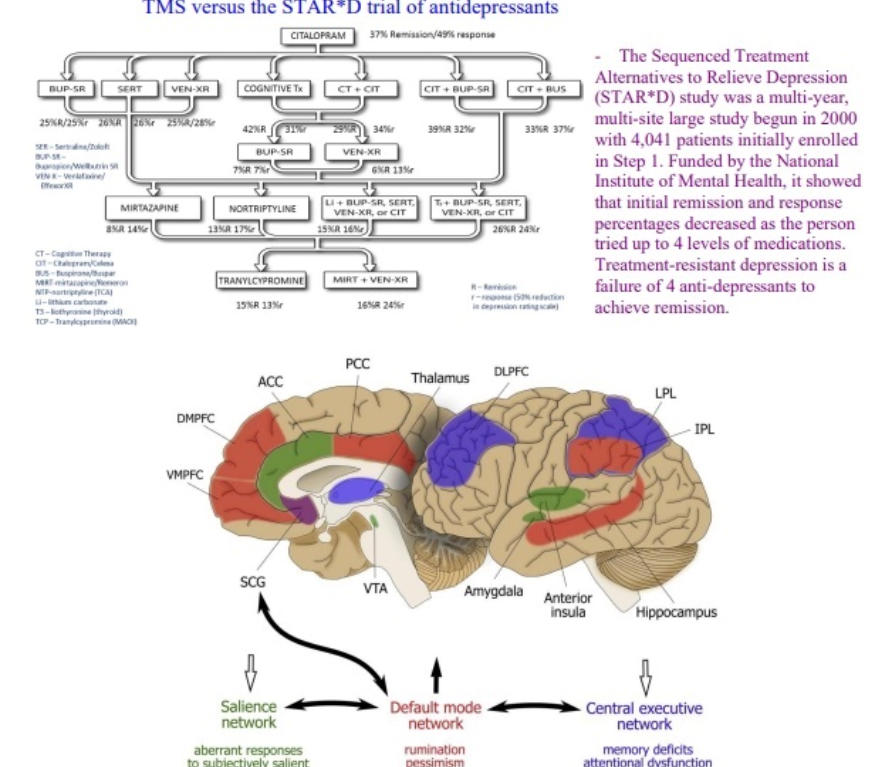
What does TMS do?
TMS works on circuits in the brain, neurons/nerve cells that fire together and wire together to form discrete but correctable networks. The Central Executive Network CEN is underperforming leading to poor concentration and forgetfulness in depression. The Default Mode Network DMN in depression is overactive, leading to brooding, ruminating negative thoughts. The Salience Network SN is your brain’s channel selector and instead of tuning in your creative, supportive, optimistic Central Executive Network, it’s tuned into the morbid Default Mode Network. By stimulating and strengthening the connections of the CEN and SN and turning down the DMN, health is restored and the depression remits. This is accomplished by high frequency 10 Hz repetitive magnetic stimulation from an MRI-strength 2 tesla stimulator and fluid-filled figure-of-8 coil. The induces a current in the brain much like a wireless charger for your cell phone or electric toothbrush placed on top of it. It’s a non-invasive means of stimulating the brain with little-to-no side effects, no memory loss and most treatments take only 23 minutes. TMS of Knoxville is proud to be the first TMS clinic in east Tennessee and the first in the eastern US to purchase and use the first cooled, fluid-filled coil made by MagVenture. They are a Danish company with a long history, making the first liquid-cooled coil and many other innovations.
TRANSCRANIAL MAGNETIC STIMULATION IN DETAIL
We consistently achieve a 56% remission rate
CELEBRATING 13 YEARS OF SERVICE !
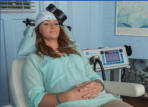
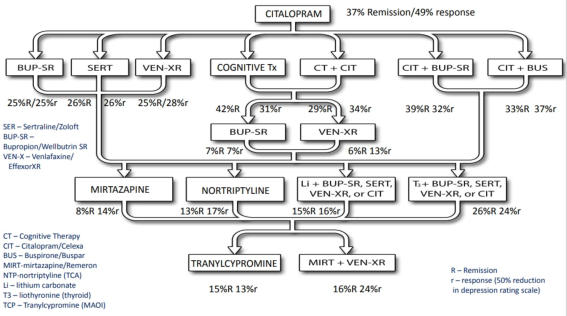
For more information about TMS and how you
can see if TMS is right for you, speak to Kelly
Talaricoor Regan Christenson or go to:


The Sequenced Treatment Alternatives to
Relieve Depression (STAR*D) study was
a multi-year, multi-site large study that ran
from 2000-2007. They enrolled 4,041
patients in Step 1. Funded by the National
Institute of Mental Health, it showed that
the initial remission and response
percentages decreased as the person tried
up to 4 levels of medications.
Treatment-Resistant Depression is a
failure of 4 antidepressants to achieve
response or remission. We consistently
achieve a 56% remission rate with TMS.

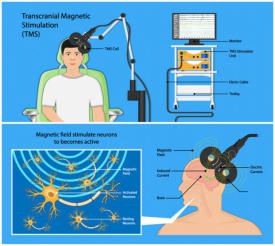
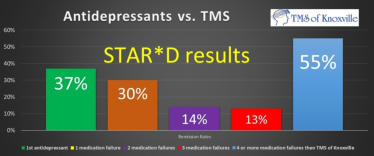



Sutherland Psychiatry PLLC/TMS of Knoxville | 4428 Sutherland Ave
Knoxville, TN| 37919| Tel: (865) 588-6425
Information for Candidates
Medicare and all major commercial insurance pays for TMS for moderate-to-severe depression. Most insurance requires that the patient has failed 4 antidepressants or combination trials (with add-on meds), a trial of psychotherapy/counseling. Our patients typically have been on 8-10 different meds and suffered from depression for years to decades.What does TMS do?
TMS works on circuits in the brain, neurons/nerve cells that fire together and wire together to form discrete but correctable networks. The Central Executive Network CEN is underperforming leading to poor concentration, forgetfulness in depression. The Default Mode Network DMNin depression is overactive, leading to brooding, ruminating negative thoughts. The Salience Network SN is your brain’s channel selector and instead of tuning in your creative, supportive, optimistic Central Executive Network, it’s tuned into the morbid Default Mode Network. By stimulating and strengthening the connections of the CEN and SN and turning down the DMN, health is restored and the depression remits. For more info click below:
Transcranial Magnetic Stimulation

Member,
Clinical
TMS Society
Our Stimulator by




www.sutherlandpsych.com


Psychiatry for Adults & Transcranial Magnetic Stimulation








